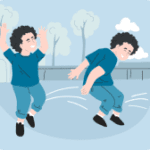Bedwetting: Reasons and Strategies
Bedwetting: Reasons and Strategies
Bedwetting can be a challenging situation for both children and parents, especially when a child has sensory-processing difficulties. For young children, it is important to approach this issue with patience and understanding, acknowledging that every child develops at their own pace. You may also need to consider a vast variety of reasons why your child may be wetting the bed. Let’s look at the reasons and strategies of bedwetting.
Why is my child wetting the bed?
First, consider that wetting the bed can be simply developmental in nature at your child’s current age. Your child’s bladder goes through a process of maturation. For some children, it simply happens later than for others. Secondly, consider that some children are deep sleepers and therefore miss the signals of a full bladder. Your child also can simply be overproducing urine. Normally, the body produces less urine at night than during the day due to a hormone called antidiuretic hormone (ADH). If the body doesn’t produce enough ADH, this can resulting overproduction of urine during the night, leading to bedwetting. Another reason to consider is the genetic factor! If one or both parents experienced bedwetting as children, their children are more likely to go through the same issue. Other reasons can include stress and anxiety. Changes such as starting school, moving to a new home or familial conflicts might trigger episodes of bedwetting in children. You may need to look at your current home life situation – for example, is there more arguing or specific situations your child may find stressful happening inside the home lately? Or look outside the home – is something happening at school that your child finds challenging or uncomfortable? Other options for bedwetting can include UTIs that result in more urine production, constipation causing pressure on the bladder, or even sleep apnea – although consider that these options are more rare in children. Remember that punishing or shaming a child for bedwetting can cause emotional distress and actually worsen the situation. In most cases, children outgrow bedwetting on their own.
What can I do to stop my child from wetting the bed?
Here are a few strategies to consider.
Create a Comfortable Environment: Children with sensory-processing challenges often benefit from environments that cater to their sensory needs. Ensure that the bedding and pajamas are of materials that feel comfortable to your child. Some children may respond well to weighted blankets, which help provide a sense of security.
Establish a Pre-bedtime Routine: Routine is reassuring. Establish a calming pre-bedtime routine that includes going to the bathroom. Limiting liquids an hour before bedtime can also reduce the likelihood of bedwetting. Activities such as reading a book or listening to soothing music can help relax your child.
Use a Bedwetting Alarm: A bedwetting alarm can be an effective tool for many children. The alarm senses moisture and wakes the child so they can go to the bathroom. This can be particularly helpful for children who struggle to wake up on their own when they need to urinate.
Practice Bladder Training: During the day, encourage your child to use the bathroom at regular intervals. This can help them learn to recognize the sensations associated with a full bladder. Gradually increasing the time between bathroom breaks can also help increase bladder capacity and control.
Positive Reinforcement: Celebrate successes with positive reinforcement, rather than focusing on accidents. You can use a reward chart to track dry nights, emphasizing progress and effort rather than perfection. Ensure that any rewards are meaningful to your child and reinforce their self-esteem.
Seek Professional Advice: If bedwetting continues or if you have concerns about your child’s development, it’s important to consult a healthcare provider. They can rule out any underlying medical conditions and provide guidance tailored to your child’s needs. Occupational therapists can also offer strategies to help children with sensory-processing difficulties.
Encourage Independence: Encourage independence by teaching your child simple nighttime routines they can do on their own, such as using the bathroom before bed and changing their clothes if they get wet. This can help build their confidence and sense of responsibility.
Be Understanding and Supportive: It’s crucial to approach the situation with empathy. Make sure your child understands that bedwetting is a common part of growing up and it is not their fault. The emotional support from parents can significantly impact a child’s confidence and motivation to overcome bedwetting.
Bedwetting can be a complex issue for children, especially those with sensory-processing difficulties, and there’s no one-size-fits-all solution. By combining patience, understanding, and a range of strategies, you can support your child through this phase of development. Remember, every child is unique, and what works for one child may not work for another. Celebrate small victories along the way and try to maintain a positive outlook. You got this!









 Speech Therapy
Speech Therapy Physical Therapy
Physical Therapy Occupational Therapy
Occupational Therapy